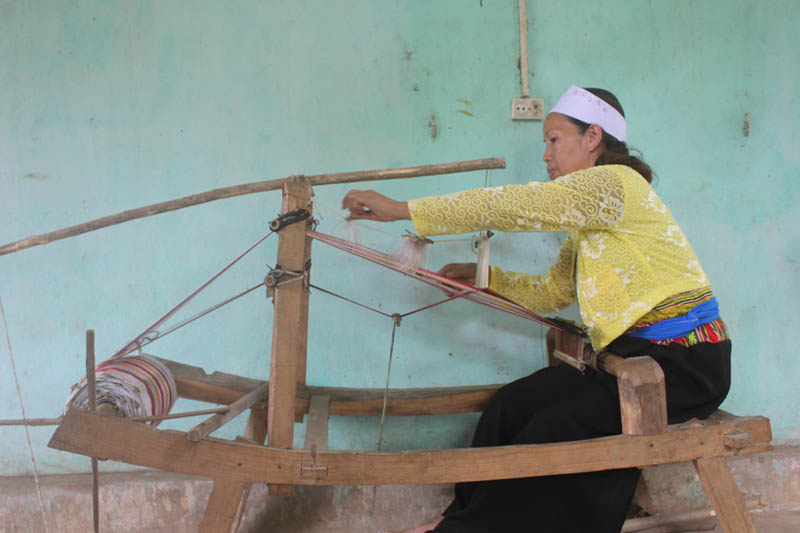
(HBO) – To Duong Thi Bin, brocade weaving is not only a job but also a passion. The woman, who comes from Luc hamlet, Yen Nghiep commune, Lac Son district of Hoa Binh province, always wants the brocade weaving will be preserved and developed in her hometown and her love for brocade has lit up faith of young generation in the future of the traditional craft.
The establishment of Luc Nghiep Thanh Limited Company,
a local brocade producer, has created jobs for more than 200 women in the
commune, showing the vitality of the brocade craft and those who are
enthusiastic about traditional cultures.
Since an early age, Bin has been very curious and
exciting when observing women in her village sitting in front of the looms and
weaving the brocades every day. That motivated her to learn how to weave in the
hope of making Muong colourful traditional dresses, pillows or blankets with
her own hands.
Over three decades have gone by since then, which is
also the time she has worked with brocade. She is now among the most skillful
at brocading and also the director of the company.

Duong Thi Bin works
ardently in front of the loom.
Bin used to be a member of the communal Women’s
Union. In 2008, she and other women at her hamlet
received 50 million VND from the employment support fund of the union to build
the looms. With a determination to preserve the brocade weaving which was
facing threat of oblivion, she decided to open her own brocade company two
years later, giving job opportunities for many local women.
At the beginning, her company has been given support
by the local industry promotion centre, which has provided 200 local workers with
three-month training courses on weaving. Now the company has many skillful weavers,
capable of passing their knowledge to others.
As the company’s leader, Bin joined hands with her workers to create numerous
brocade products like bags, scarves, skirts and shirts.
Bin said that her great passion for brocade beauty has required her to work to
preserve the country’s traditional craft by spreading it among the young
generation. Since the company was set up, communal women have stronger
attachment to brocade weaving.
In the first days, Bin herself found consumption markets for her brocade
products. After joining local fairs and those held in neighbouring provinces,
her products have been present in many localities across the country like Thanh
Hoa, Phu Tho, Son La and
Ho Chi Minh
City. Although there has been yet large order, her
company still maintains small ones. Old ethnic women sell brocades at rural
markets as a way to protect the culture.
Currently, the company has 168 members, however, the number of weaving looms
reaches 300 at peak.
Bin and six or seven skillful women opened brocade training courses for the
younger generation in the commune. They share weaving experience in their free
time to complete their weaving skills. Products made by the company are famous
for good quality, diversified designs and reasonable prices, thus gaining trust
from customers./.
Phong Phu commune, Tan Lac district of Hoa Binh province, is widely regarded as the cultural heartland of the Muong ethnic group. Among its many traditional communities, Luy Ai hamlet (formerly Ai hamlet) stands out as a rare location where the customs and way of life of the Muong Bi people remain largely intact.
The Truong Kha temple festival, a distinctive cultural event held every three years in Vu Ban township, Lac Son district, returned recently with vibrant rituals and folk traditions of the Muong people. Located next to the Buoi River in the Muong Trao fields, the Truong Kha Temple is dedicated to the three Kun Dol deities, revered for teaching farming techniques, irrigation, weaving, and protecting the harvest.
The demand for spaces serving community activities of residents in various areas across Hoa Binh city has been satisfied as local cultural houses now feature modern, spacious facilities thanks to the effective implementation of Resolution No. 49/NQ-HDND issued on December 28, 2021 by the city People's Council, which approved the plan for reorganising, converting, and allocating land for the construction, repair, and expansion of cultural houses in Hoa Binh’s villages and residential areas until 2025.
At the end of May, the Hoa Binh Provincial Ethnic Arts Troupe organized a series of performances for residents in Region 2 and Region 3 communes across the province. Bringing art to ethnic communities in remote, isolated, and especially disadvantaged areas has become a meaningful activity. These are not merely artistic performances but also journeys to disseminate cultural values, enrich spiritual life, and contribute to preserving the cultural identity of ethnic minorities.



